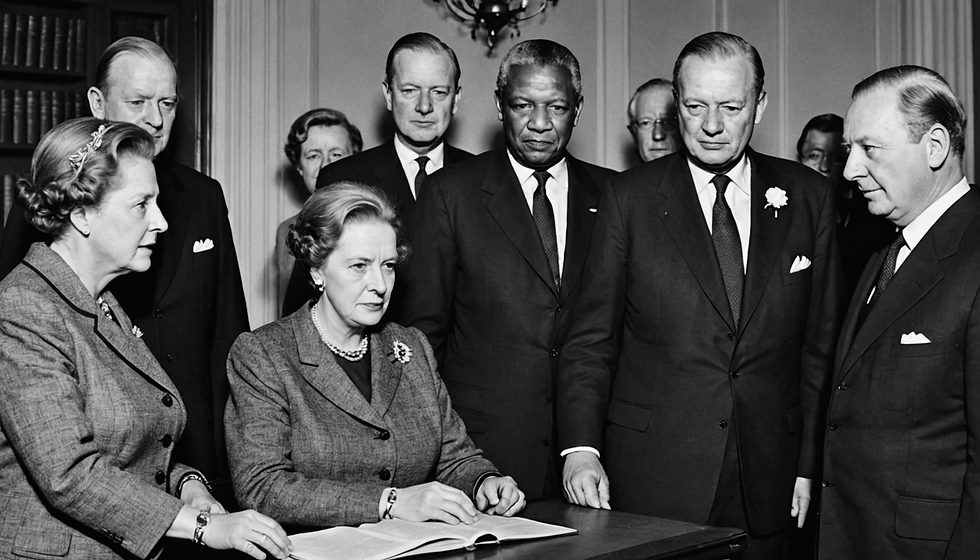Dissecting "interests" in negotiations: Strategic foresight
- R.M. Boylan

- Feb 26
- 4 min read
Updated: Mar 9
R.M. Boylan BSc. M.A.

Understanding Positions vs. Interests in Negotiations
Dissecting "interests" in negotiations: Strategic foresight"Positions" vs. "Interests"
In negotiations, the terms "positions" and "interests" are often used to describe the different elements that parties bring to the table.
Positions: These are the specific demands or statements that a party makes during negotiations. For example, in a negotiation between 2 nations, a position might be "I want the crime dropped at the border and I will reconsider tariffs."
Interests: These are the underlying needs, desires, or motivations that drive a party's position. In the border example, the "interests" include taking over Canada to have access to its mineral resources, water, hydro, oil and other natural resources.
Importance of interests
Interests are often more important and deeply rooted than positions for several reasons:
Underlying Needs: Interests reflect the true motivations behind a party's position, making them essential for understanding the broader context of the negotiation.
Flexibility: By focusing on interests rather than positions, parties can find creative solutions that satisfy both sides, leading to more sustainable agreements.
Conflict Resolution: Understanding interests helps to de-escalate conflicts and foster collaboration, as parties are more likely to empathize with each other's needs.
Scholars such as Fisher and Ury in their seminal work "Getting to Yes" emphasize the importance of interests over positions, advocating for interest-based negotiation strategies (Fisher, R., & Ury, W. L. (1981). *Getting to Yes: Negotiating Agreement Without Giving In*. Penguin Books).
Recognizing hidden interests
In negotiations, parties may hide their interests to manipulate the situation. Signs that someone is concealing their interests include:
Vagueness or ambiguity in their statements.
Inconsistencies between their stated positions and their behavior.
Defensive or evasive responses to questions about their motivations.
Reframing to focus on interests
To refocus on interests, negotiators can employ several strategies:
Ask Open-Ended Questions: Encourage the other party to elaborate on their needs and motivations.
Active Listening: Demonstrate understanding and empathy to create a safe space for sharing interests.
Identify Common Ground: Highlight shared interests to foster collaboration and trust.
Developing a negotiation strategy
To gather all interests from the other party and formulate a negotiation strategy:
Conduct Research: Understand the other party's background, past negotiations, and potential interests.
Build Relationships: Establish rapport to encourage openness and sharing of interests.
Facilitate Joint Problem-Solving: Create an environment where both parties can brainstorm solutions that address their interests.
Key unique abilities in negotiation
One of the essential abilities in negotiations is:
Strategic Foresight
Strategic foresight is the ability to see and anticipate future trends, challenges, and opportunities. People with this skill innnately can predict and foresee the future based on interpersonal sensitivity skills.
This skill is crucial in negotiations for several reasons:
Anticipating Reactions: Understanding how the other party may respond to various proposals can help in crafting effective strategies.
Long-Term Planning: Strategic foresight allows negotiators to consider the long-term implications of their agreements and to prepare for future negotiations.
Adaptability: Being able to foresee potential obstacles enables negotiators to adapt their strategies proactively.
In conclusion, understanding the distinction between positions and interests is vital for successful negotiations. By focusing on interests, negotiators can create more meaningful and sustainable agreements while employing strategic foresight to navigate the complexities of the negotiation landscape.
References and Resources
Boylan, R.M. (2006-2009). Conflicts and considerations comparing Abraham Maslow's
hierarchy of needs to Jane Loevinger's model of ego development for assessing the level of development of a leader. M.A. Leadership Studies.
Blair, R. J. R. (2005). "Responding to the Emotions of Others: Dissociating Forms of Empathy through the Study of Antisocial Personality Disorder." Emotion, 5(1), 1-10.
Braden, G. (2000). The Isaiah Effect. Harmony Books.
Brunsson, N. (2007). The consequences of decision-making. Oxford University Press.
Cialdini, R.B. (1993). Influence: The Psychology of Persuasion. Harpers Collins
Publishers.
Cooper, D. F., & Chapman, C. B. (2005). Risk Management: A Project Management Approach. Taylor & Francis.
Covey, S. The 7 Habits of Highly Effective People. (1989). Stephen Covey.
"Dark Triad". Psychology Today United Kingdom. Retrieved July 6, 2022. First published by Delroy, L. Paulhus and Kevin M. Williams in 2002
Deutsch, M., Coleman, P.T. (2000). The Handbook of Conflict Resolution: Theory and Practice. Jossey-Bass Publishers.
Fisher, R., Ury, W., & Patton, B. (2011). Getting to Yes: Negotiating Agreement Without Giving In. Penguin Books.
French, J. R. P., & Raven, B. (1959). The bases of social power. In D. Cartwright
(Ed.), Studies in Social Power (pp. 150-167). Ann Arbor: University of Michigan Press.
Hare, R. D. (1991). The Hare Psychopathy Checklist-Revised (PCL-R). Toronto: Multi-Health Systems.
Harvard Business Review. (2019). On Negotiation. Harvard Business Review Press
Harvard Negotiation Project https://www.pon.harvard.edu/tag/the-harvard-negotiation-project/
Hofstede, Geert. (2017). Culture’s Consequences: Comparing values, behaviours, institutions and organizations across nations. A MASCAT Analysis.
Jung, C.G. (2002). Psychology of the Unconscious. Dodd, Mead & Company.
Kruglanski, A. W., & Webster, D. M. (1996). Motivated closing of the mind: "Seizing" and "freezing." Psychological Review, 103(2), 263-283.
Lewicki, R. J., Barry, B., & Saunders, D. M. (2015). Negotiation (7th ed.). McGraw-Hill Education.
O’Connor, J. & Prior, R. (1995). Successful selling with NLP: Neuro-linguistic programming the way forward in the new bazaar. Harper Collins Publisher.
Pritchard, C.L. (2001). Risk Management: Concepts and guidance Second edition. ESI International.
Rackham, N. (1988). SPIN Selling. Situation, Problem, Implication, Need-Payoff. McGraw-Hill Book Company.
Raiffa, H. (2002). Negotiation Analysis: The Science and Art of Collaborative Decision Making. Harvard University Press.
Raiffa, H. (1982). "The Art and Science of Negotiation." Harvard University Press.
Raine, A. (2002). "Biosocial Studies of Antisocial and Violent Behavior." Journal of Abnormal Psychology, 111(1), 1-10.
Ries, A. Trout, J. (1981). Positioning : The Battle for your mind. Werner Books.
Salacuse, J.W. (2008). Seven secrets for negotiating with government: How to deal with local, state, national, or foreign governments and come out ahead. AMACOM
Thompson, L. (2014). The Mind and Heart of the Negotiator (6th ed.). Pearson.
Ury, W. (1993). Getting Past No: Negotiating Your Way from Confrontation to Cooperation. New York: Bantam Books.
Weiss, J. (2016). Harvard Business Review Guide to. Negotiating: Take the Lead Manage Conflict Get to Yes. Harvard Business Review Press





Comments